Cost Benefit of Dental Implants
Surprisingly, dental implants are more affordable compared to other tooth replacement options, especially when you consider long-term cost effectiveness and quality of life. The maintenance and repair of dental implants is minimal compared to dentistry on teeth.
Regular dentistry on teeth continually fails over time and progresses to larger restorations, root canals, crowns, then to a bridge, and finally to tooth loss. After numerous efforts and escalating costs from trying to save a doomed tooth, it is important to appraise if more dentistry on a failing tooth is worthwhile. The better choice is a dental implant which offers a lifetime of problem-free service and peace of mind.
Dental Implants: The Better Choice
Dental implants have enjoyed over 70 years of use in humans with the lowest failure rate of any medical device ever produced. Although it may seem like dental implants may be more costly at first, in the long run dental implants outlast teeth that are subject to dentistry after dentistry. Teeth are subject to cavities, fillings, crowns, root canals, gum disease and bite trauma, all adverse factors that lead to tooth loss. A dental implant is impervious to cavities, gum disease, never needs a root canal and can withstand greater bite forces and therefore provides lifelong health and function.
BOTTOM LINE: Dental implants are more reliable than teeth over time.
The Cycle Of Continuous Dentistry
Stage 1: of this cycle is a simple cavity that grows larger over time.
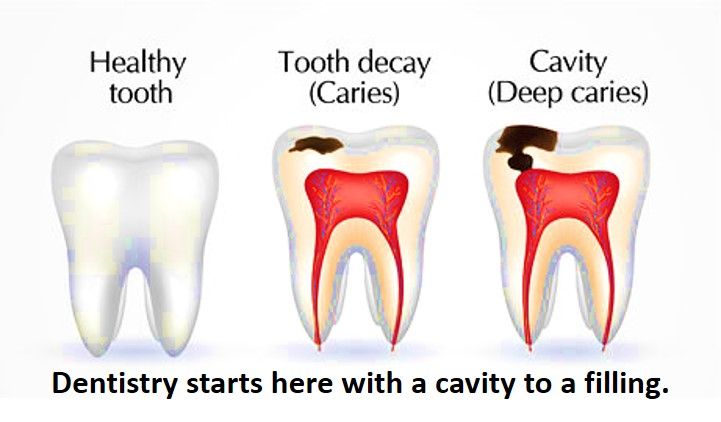
Stage 2: Results in decay removal and placement of a simple filling.
All seems well for a season and then one day the filling does not hold up.
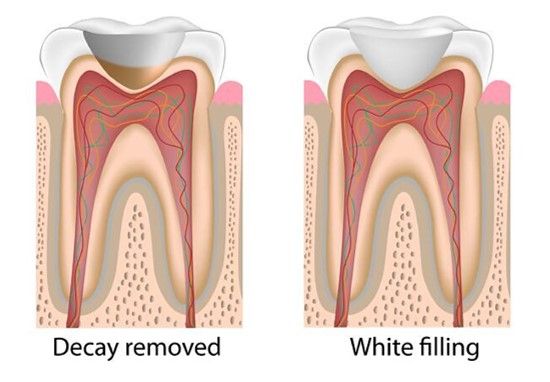
Stage 3: Results in removal of the old filling and placement of a crown.
The crown seems fine for a season until it leaks underneath, and decay gets into the root.
Filling breaks down and now a crown is made.
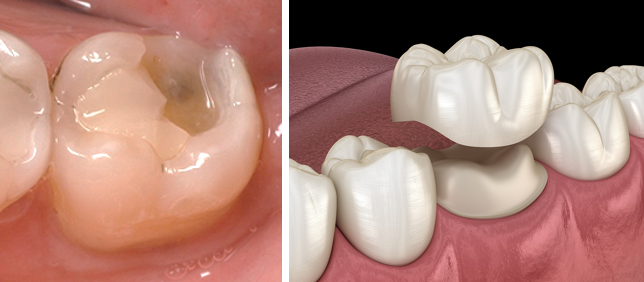
Stage 4: Results in leakage underneath the crown and damage to the tooth nerve. Now a root canal is recommended and a new crown. The root canal shaping process weakens the tooth structure internally making it more susceptible to root fracture. Remember a root canal tooth is dead in your body and cannot repair itself.
Crown leaks and cavity forms with new infection leading to root canal.
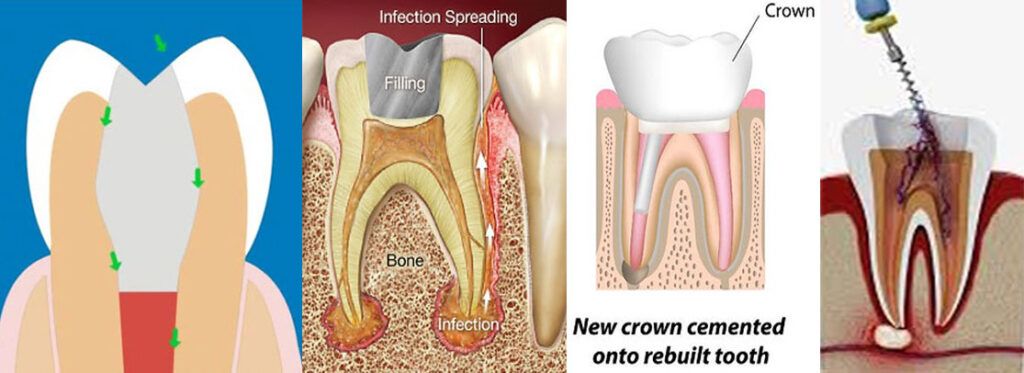
Stage 5: Results in constant bite forces on the brittle root canal tooth, and leakage can occur under the crown infecting the root canal filling. This microleakage may lead to decay and tooth fracture. What’s unusual is that one day the tooth just breaks apart. No advance warning was detected because the decay was obscured by the metal and porcelain of the crown.
The brittle root canal tooth fractures (arrow) and is removed.

Stage 6: Results in removal of the tooth in which you paid for a filling, a crown, a root canal, and a new crown and an extraction. Now the dentist hands you the broken and decayed tooth and says, “It’s time for bridge”.
And all this happens to just one tooth! How many more teeth in your mouth are somewhere along this path?
Now the dentist recommends a bridge.
AND THE PROCESS STARTS ALL OVER AGAIN!
On two new teeth!
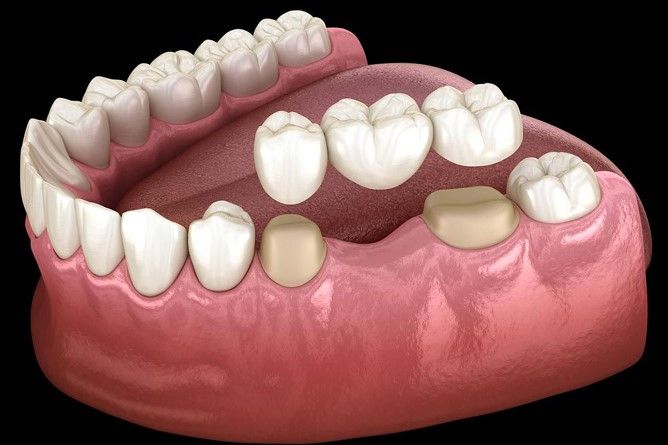
Dentistry Forever
Continuous dentistry from a cavity to a filling to a new filling to a crown to a root canal to a root canal re-treat and then the dentist hands you the broken tooth and says now you need a bridge…and the process starts all over again! This is called the gravy train of dentistry!
If you feel trapped in this never-ending unstable dentistry, you should consider dental implants for a stable healthy mouth.
Break the cycle of continuous dentistry by choosing a dental implant.
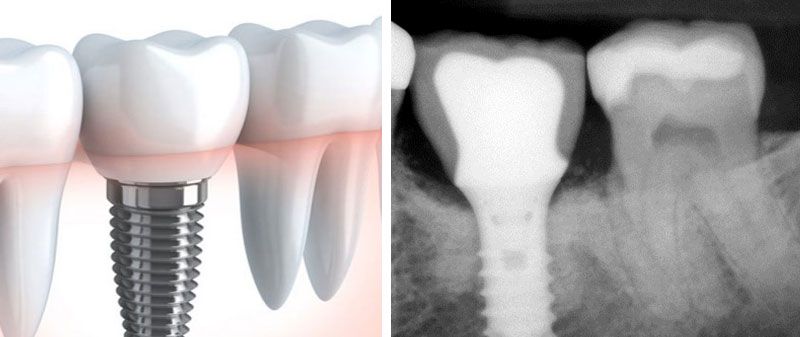
Dental Implants Are Lifelong
Dental Implants interrupt the process of continuous dentistry over and over without a stable healthy outcome. Dental implants bring health and definitive stability to your soft tissues, jaw bone, bite function, and support the adjacent teeth. Dental implants are not subject to cavities, never need root canals, never break, and are not subject to the traditional gum disease process.
When placed by a Board-Certified Dental Implant Expert, dental implants are a lifelong investment. And, unlike fillings, veneers, crowns or dental bridges, dental implants and the dentistry upon them do not normally need replacing with proper maintenance and care.
What kind of dentist specializes in dental implants?
One of the big factors in the long-term cost-effectiveness of dental implants comes down to how it’s placed and the experience and education of the dentist who placed your implant.
During your initial consultation, it is always important to ask:
“Have you received specialist training in Periodontics or Oral Surgery and are you Board-Certified or credentialed by the American Dental Association National Commission on Recognition of Dental Specialties?”
There is a huge difference between regular general dentists who claim, “to do implants”, and a Board-Certified Dental Implant Specialist. After completing Dental School, a Board-Certified Dental Implant Specialist must also complete an additional series of rigorous requirements, from written and oral examinations to a review of their advanced clinical dental implant expertise by a panel of their peers, proving they have achieved the highest level of competence in both implantology and bone grafting. Only a small percentage of dental specialists are able to become Board-Certified in Dental Implant Dentistry. Board-Certification ensures optimal training, knowledge and exceptional care.
Do not take the Doctor’s training lightly: it could mean the difference between a successful and lasting result or it could become a short-lived throng of complications and failure with loss of your health investment. Please do your due diligence when you choose a properly trained dentist to insert dental implants into your jaws.
“A weekend course, mini-course or boot camp for general dentists does not compare to the 3-6 years of intensive training and experience gained during Dental Implant Specialty Training.”
Dr. Bramanti is one of only 85 Board-Certified Dental Implant Specialists in California, out of the 20,000+ dentists who report they place dental implants.
Board-Certified Dental Implant Experts are Specialists who invest significant time and energy into dental implant-focused training, advanced bone grafting techniques, and scientific literature review above and beyond their basic dental and/or specialist education. Choosing the most qualified and highly trained clinician who is a Board-Certified Dental Implant Specialist will not only ensure the best treatment possible but will also provide peace of mind that you are truly in the hands of a highly trained Dental Implant Expert.
